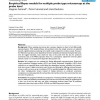99 search results - page 9 / 20 » Ranking and Scoring Using Empirical Risk Minimization |
182
click to vote
SIGMOD
2009
ACM
16 years 2 months ago
2009
ACM
In the rank join problem we are given a relational join R1 1 R2 and a function that assigns numeric scores to the join tuples, and the goal is to return the tuples with the highes...
141
click to vote
IJCAI
2001
15 years 3 months ago
2001
For many supervised learning tasks it is very costly to produce training data with class labels. Active learning acquires data incrementally, at each stage using the model learned...
123
click to vote
BMCBI
2008
15 years 2 months ago
2008
Background: When analyzing microarray data a primary objective is often to find differentially expressed genes. With empirical Bayes and penalized t-tests the sample variances are...
133
click to vote
ACL
2006
15 years 3 months ago
2006
When training the parameters for a natural language system, one would prefer to minimize 1-best loss (error) on an evaluation set. Since the error surface for many natural languag...
114
click to vote
ICML
2010
IEEE
15 years 3 months ago
2010
IEEE
We present a theoretical analysis of supervised ranking, providing necessary and sufficient conditions for the asymptotic consistency of algorithms based on minimizing a surrogate...

